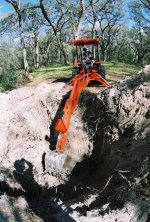Farmwithjunk
Super Member
gemini5362 said:Ok if horsepower is the same thing no matter whether diesel or what then why is it that my 15 horsepower b6100 kubota diesel tractor with a 60 inch mower deck will cut through all kinds of high thick grass with no problems. My 20 horsepower riding mower with a 36 inch deck will bog down and die in grass half as tall or half as thick. both of them were 6 speed and I believe the top speeds in 6th gear was not that much different. My gass mower had only to run a mower deck that was almost half the size. Could it be that my diesel kubota has more torque than the gas riding lawn mower and since torgue is what actually turns things that might be more important than the horsepower rating.
For beginners, a lawn mower engine and a diesel in a tractor are "rated" in a very different manner. Most "lawn mower engines" (That's what we'll call 1 and 2 cylinder "cookie cutter" utility engines for now) are rated without any load, no accessories, oil NOT normally used in such an engine, running wide open (sometimes WAY over normal RPMs) and under a very controlled environment. Several well known manufacturers use a "math formula" to determine their rating in place of an actual dyno test. Their findings are subject to liberal interpretation. With engines installed in tractors or trucks, generally they're tested and rated in a simulated working configuration, (on a dyno) and NOT stripped down, no accessories, oil being pumped and cooled externally, and without a load. A 20 HP Briggs & Stratton won't put 20 HP to the ground in any event. My Deere lawn mower has a Kawasaki 17 hp single cylinder engine. Old 9N's had about the same rated hp. That 9N would drag 4 or 5 of my lawn mowers backwards in a back to back "pull-off", weight being equalized somehow.
Back in "the old days", tractors were generally compared amongst farmers and typical end users with ONE NUMBER.... PTO HP. While engine hp has some use, it doesn't represent what your tractor is capable of doing "on the job". I'm of the belief that engine HP numbers are popular ESPECIALLY on lower hp units just because it makes people think they have a bigger tractor than what they do have. In the end, you've got what you've got. CLAIMING higher HP numbers won't make it any more powerful. You don't take just an engine out to do a days work. What matters is PTO HP or DRAWBAR HP. And those numbers aren't always as accurate as the engine builders would lead us to believe.
I'm still not impressed with all the numbers and "facts" that are used for comparison sake on todays tractors. They're virtually meaninless since no 2 manufacturers use the same "standard" of comparison. Seems a lot of folks just eat up this info. Without a standardized testing, anyone can claim ANYTHING.
Gas vs. diesel.... Diesel is better? At what. Gas is terrible? again, at what? We have a couple pick ups at work that are for running errends. One is a diesel (Dodge) One is a gasser (Dodge) Both are 2003 models. Both have around 90,000 miles on them. They make several short runs a day, never allowing it to warm up before hitting the road, seldom running long enough to sustain operating temp for more than a few minutes. The diesel is ragged out, and in need of work. The gasser is still in great shape. There's one case where the gas engine is far superior.
Without a doubt, a diesel is a better choice for sustained pulling or hard work. Gassers are better for short hauls. (Both come in a chassis that won't go 1,000,000 miles without extraordinary maintenance and repairs anyway) Gas is WAY cheaper here as compared to diesel. There are circumstances where a gas engine is superior or at least equal to a diesel in over-all performance/economy/longevity.
The "numbers game" manufacturers have everyone so concerned about is "smoke and mirrors". The ONLY real accurate comparison is side-by-side testing while doing an actual job. Obviously, by the fact that tractor manufacturers don't offer us an independent testing on the smaller rigs they sell, (like the Nebraska Test of bigger AG tractors) we can only assume they don't want us to know the REAL facts.
And making claims that "engine A" is better than "engine B" because one is diesel and the other is gas, or making the same sort of claim because on engine builder claims his 6-cylinder has 50 more HP than their rivals engine is pure folly. It's not that cut and dried.
It's all about how they actually PERFORM, and NOT how they are hyped by the folks trying to sell you one.
And keep in mind that no 2 people use their truck/tractor/lawn mower/ect in the same manner. What's best for YOU, might not be anything at all like what I need.
Last edited:

